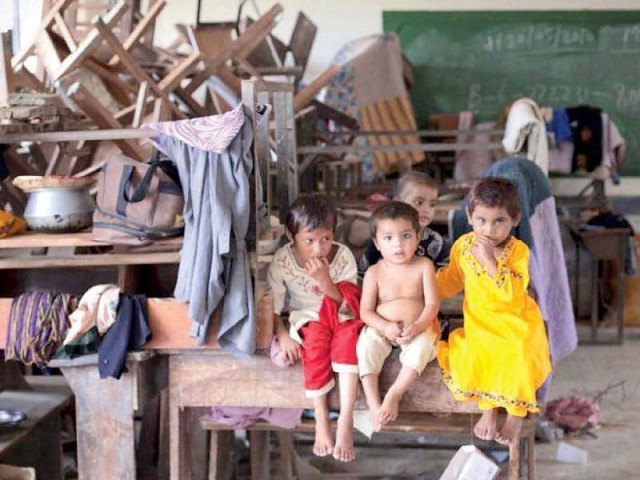A missed opportunity: Half of Sindh’s enrolled students drop out before reaching class 5
ACTED report says children drop out because education system does not fulfil its promises

Little children sit at a ramshackle school. Broken furniture and clothes are littered
everywhere instead of children learning how to read and write. PHOTO: FILE
Almost half of the 800,000 children that are enrolled in class one in Sindh each year drop out before they reach class five.
Believing that there was a 'missed opportunity' in terms of retaining these children and ensuring their smooth progression through the public education system, the Agency for Technical Cooperation and Development (Acted) — a non-government organisation set up in 1993 to intervene in times of crisis — took up the under-researched phenomenon of dropouts in 2013.
The organisation held a dissemination workshop at the Pearl Continental hotel on Thursday to share its findings in the form of a report, titled 'Pathways through Education: Dropout and Students at Risk in Rural Sindh.' The event brought together a number of stakeholders, including government officials, donors, NGOs and media, to formulate a roadmap and recommendations for reducing student dropout in the future.
"The overall goal is to increase the retention of students at risk of dropping out of school and to support the reintegration of dropout students at the primary level by involving communities, establishing linkages and creating an evidence base," Clara Straimer, the head of research at Acted Pakistan and author of the report, told The Express Tribune.
"When we first started our research, we felt the issue had not yet been addressed in a comprehensive way in current policy documents," she explained. "So, we felt the need to explore this problem because the factors that influence dropout are not the same for every child."
To the surprise of the researchers, the key findings of the project revealed that many parents in rural Sindh do want to send their children to school but the education system did not fulfil its promises.
"It [the education system] does not provide what parents expect to see: their children are not learning, the teachers are absent. The educational as well as economic opportunities their children have after primary schooling are very limited," explained Straimer.
Acted's second finding was that the children themselves were very actively involved in deciding to drop out. "The children often decide that the school environment is not engaging enough and eventually they decide to drop out against their parents' will," she revealed.
Discussing critical tipping points, Straimer argued that children were at risk of dropping out from the age of 10 onwards, when they were considering starting their adult lives. Interventions should therefore specifically target this age group, she noted.
"While age is a critical factor, we also found that it is not the only one; the changes in the family's earning opportunities also adversely affect boys," she added. "However, these crises often happen over a longer period of time until the situation has deteriorated so far that the child or the parents see no other option."
Such crisis points, said Straimer, can be identified early on by active communities, school management committee members and parents. "However, for them to take action, we first have to restore their faith in the education system."
The first step towards ensuring this, she continued, was to create a system in which parents could more easily evaluate their children's progress and the quality of schooling.
"Some concrete actions are required at higher levels to ensure that education fulfils its promises," she said. "Children need to be learning, teachers need to be teaching regularly and in an engaging manner and education needs to provide real opportunities to children in rural areas."
Published in The Express Tribune, May 9th, 2015.



















COMMENTS
Comments are moderated and generally will be posted if they are on-topic and not abusive.
For more information, please see our Comments FAQ